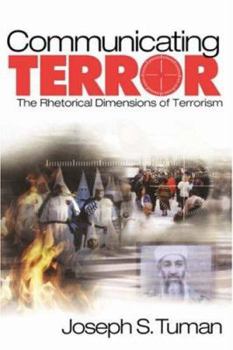Communicating Terror: The Rhetorical Dimensions of Terrorism
Select Format
Select Condition 
Book Overview
Communicating Terror: The Rhetorical Dimensions of Terrorism argues that the meaning of terrorism is socially constructed and suggests a new definition of terrorism, chiefly as a process of communication--between terrorists and multiple target audiences. Concise yet comprehensive, this text examines how acts of "terrorism" create rhetorical acts: What messages, persuasive meanings, symbols, do acts of terrorism generate and communicate to the world at large? These rhetorical components include definitions and labels, symbolism in terrorism, public oratory about terrorism, and the relationship between terror and media. This unique communication perspective shows how the rhetoric of terrorism is truly a war of words, symbols, and meanings.
argues that the meaning of terrorism is socially constructed and suggests a new definition of terrorism, chiefly as a process of communication--between terrorists and multiple target audiences. Concise yet comprehensive, this text examines how acts of "terrorism" create rhetorical acts: What messages, persuasive meanings, symbols, do acts of terrorism generate and communicate to the world at large? These rhetorical components include definitions and labels, symbolism in terrorism, public oratory about terrorism, and the relationship between terror and media. This unique perspective shows how the rhetoric of terrorism is truly a war of words, symbols, and meanings.Format:Paperback
Language:English
ISBN:0761927662
ISBN13:9780761927662
Release Date:May 2003
Publisher:Sage Publications, Inc
Length:176 Pages
Weight:0.66 lbs.
Dimensions:0.5" x 6.0" x 9.0"
Customer Reviews
0 rating





